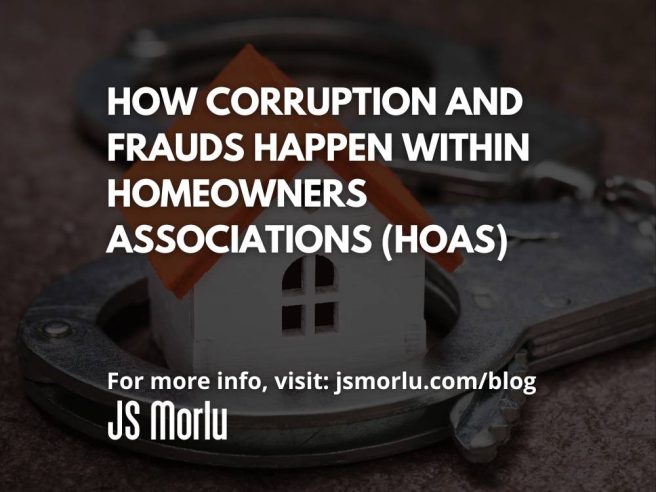By: John S. Morlu II, CPA
Homeowners Associations (HOAs) are the governing bodies for residential communities, responsible for managing shared spaces, enforcing rules, and maintaining the overall aesthetic and financial health of neighborhoods. While they often succeed in creating orderly, appealing communities, HOAs are not immune to the darker side of governance—corruption and fraud. The concentration of power, coupled with the lack of regulatory oversight that HOAs often operate under, makes them particularly vulnerable to unethical behavior.
Here, we’ll explore how corruption and fraud occur within HOAs, interspersed with industry statistics, real-world examples, and practical prevention tips.

1. Lack of Financial Transparency and Mismanagement
HOAs collectively manage billions of dollars in the United States alone. According to the Community Associations Institute (CAI), there are over 355,000 HOAs nationwide, overseeing an estimated $96 billion in annual revenues. With such substantial funds, HOAs are susceptible to mismanagement and fraud, often due to poor financial oversight.
Common Frauds:
- Embezzlement: In a prominent case in Florida, an HOA board treasurer embezzled over $2 million by siphoning money from community funds over several years.
- Skimming: Small, recurring amounts are skimmed from dues or petty cash, making the fraud harder to detect.
- False Vendor Invoices: Fake invoices from nonexistent vendors are submitted and approved, funneling money to fraudulent accounts.
Interesting Tidbit:
According to a 2020 survey by the Association of Certified Fraud Examiners (ACFE), 45% of fraud cases occur in organizations with fewer than 100 employees—a category that includes most HOAs.
2. Abuse of Power and Lack of Oversight
Board members are entrusted with significant decision-making authority, but this power can be exploited when left unchecked. Abuse of power is one of the leading causes of HOA disputes and mistrust.
Examples of Abuse:
- Favoritism in Rule Enforcement: A board president in California was exposed for waiving fines for personal friends while aggressively fining other homeowners for minor infractions.
- Unilateral Decisions: A Texas HOA unilaterally increased dues by 50% without homeowner approval, later revealed to fund a personal project by a board member.
- Rigged Elections: Manipulating election processes, such as suppressing nominations or falsifying vote counts, ensures certain individuals or cliques retain control.
Industry Fact:
The CAI estimates that only 10–15% of homeowners attend HOA meetings regularly, leaving boards with considerable freedom to operate without scrutiny.
3. Vendor and Contractor Collusion
HOAs rely heavily on vendors for services such as landscaping, maintenance, and security. Without proper bidding processes, fraud and kickbacks are common.
Real-World Example:
In 2021, a Nevada HOA discovered a $1.3 million kickback scheme involving board members and a landscaping contractor who inflated bids and provided personal gifts to board members.
Fraud Techniques:
- Phantom Vendors: Payments are made to fake companies.
- Overbilling: Legitimate vendors inflate invoices and split the excess funds with complicit board members.
- Poor Work for High Pay: Vendors deliver subpar services or use inferior materials while charging premium rates.
Tidbit:
The FBI’s Las Vegas office uncovered one of the largest HOA fraud schemes in U.S. history, involving more than 40 defendants and $58 million in fraudulent claims tied to construction defect litigation.
4. Exploitation of HOA Rules and Fines
HOA boards have the authority to enforce community rules and levy fines, a power sometimes exploited for personal or financial gain.
How This Happens:
- Arbitrary Fines: Imposing unwarranted fines for rule violations to increase revenue or target specific residents.
- Selective Enforcement: Allowing some members to violate rules while penalizing others.
- Rule Manipulation: Altering HOA bylaws without proper voting or notice to benefit certain individuals.
Interesting Fact:
Studies suggest that communities with frequent disputes over fines or rule enforcement experience 20-30% higher HOA member dissatisfaction, leading to litigation or mass resignations.
5. Weak Internal Controls and Record-Keeping
HOAs often lack professional financial systems or dedicated personnel for accounting, making them vulnerable to errors and deliberate manipulation.
Fraud Scenarios:
- Poor Documentation: Missing invoices, receipts, or meeting minutes make it difficult to audit financial activities.
- Tampering with Records: Falsifying financial reports to cover up theft or misuse.
- Obstruction of Audits: Refusing independent audits, which are critical for uncovering irregularities.
Tidbit:
A 2018 audit of a large HOA in Arizona revealed that more than $500,000 was unaccounted for due to poor record-keeping over a decade.
Preventing Corruption and Fraud
Proactive measures can protect HOAs from falling prey to corruption.
1. Strengthen Financial Oversight:
- Require independent annual audits by certified accountants.
- Implement dual signatory requirements for checks and large payments.
2. Improve Transparency:
- Publish detailed financial reports and meeting minutes online for homeowners to review.
- Mandate monthly financial updates at board meetings.
3. Foster Community Involvement:
- Encourage homeowners to participate in board elections and regular meetings.
- Conduct periodic training for board members on ethical governance.
4. Adopt Technology:
- Use accounting and management software to track expenses, maintain records, and automate audits.
- Leverage secure platforms to streamline voting and improve communication.
5. Enforce Legal Compliance:
- Ensure HOA activities adhere to state and federal regulations.
- Establish whistleblower policies to allow residents to report suspicious activities without fear of retaliation.
Conclusion
Corruption and fraud in HOAs stem from the interplay of concentrated power, financial mismanagement, and limited oversight. These issues not only drain community resources but also erode trust among residents. By understanding the risks and implementing robust governance practices, HOAs can safeguard their finances, reputation, and the communities they serve. Transparency, accountability, and community engagement are key to fostering a healthy, corruption-free HOA environment.
Author: John S. Morlu II, CPA
John Morlu II, CPA, is the CEO and Chief Strategist of JS Morlu, a globally acclaimed public accounting and management consulting powerhouse. With his visionary leadership, JS Morlu has redefined industries, pioneering cutting-edge technologies across B2B, B2C, P2P, and B2G landscapes.
The firm’s groundbreaking innovations include:
• ReckSoft (www.ReckSoft.com): AI-driven reconciliation software revolutionizing financial accuracy and efficiency.
• FinovatePro (www.FinovatePro.com): Advanced cloud accounting solutions empowering businesses to thrive in the digital age.
• Fixaars (www.fixaars.com): A global handyman platform reshaping service delivery and setting new benchmarks in convenience and reliability.
Under his strategic vision, JS Morlu continues to set the gold standard for technological excellence, efficiency, and transformative solutions.
JS Morlu LLC is a top-tier accounting firm based in Woodbridge, Virginia, with a team of highly experienced and qualified CPAs and business advisors. We are dedicated to providing comprehensive accounting, tax, and business advisory services to clients throughout the Washington, D.C. Metro Area and the surrounding regions. With over a decade of experience, we have cultivated a deep understanding of our clients’ needs and aspirations. We recognize that our clients seek more than just value-added accounting services; they seek a trusted partner who can guide them towards achieving their business goals and personal financial well-being.
Talk to us || What our clients says about us







